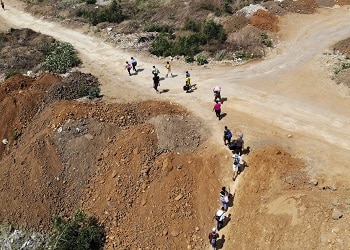In the aftermath of the closure of the Colombia-Venezuela border, criminal groups have seized control of illegal trails, known as “trochas,” that have become the only transit option for citizens moving between the two countries.
Armed groups have taken advantage of the blockade of the international bridges ever since President Nicolás Maduro’s regime ordered their closure on February 22 when the opposition attempted to bring humanitarian aid into Venezuela.
SEE ALSO: Restrictions on Venezuela Migrants Boost Criminal Networks
InSight Crime observed the presence of men with long weapons controlling the flow of people and contraband in “La Pared,” one of approximately 50 tracks that connect San Antonio municipality in Venezuela’s Táchira state with the Colombian municipality of La Parada in Norte de Santander department. People moving across the illegal passageways said there had been claims of extortion and attacks by members of Colombia’s National Liberation Army (Ejército de Liberación Nacional — ELN).
Crossing from one country to the other can cost up to 20,000 bolivars (around $7), which is more than a basic monthly salary in Venezuela. Those most affected by the bridge closures are citizens who need to go from one country to the other for work, school, or to simply stock up on food and medicines that are scarce in Venezuela amid the ongoing crisis.
The so-called “war on the ‘trochas’” has also intensified in recent months. In addition to the ELN, dissident rebels from the Revolutionary Armed Forces of Colombia (Fuerzas Armadas Revolucionarias de Colombia — FARC) and other criminal organizations are fighting for control of these trails, which are used to traffic drugs and other contraband, as well as smuggle migrants.
InSight Crime Analysis
There are scant patrols by authorities on either side of the Venezuela-Colombia border, creating a kind of “no man’s land” that has proven to be fertile ground for organized crime.
As a result, criminal groups have exploited the unguarded illegal passageways amid tensions between Colombian President Iván Duque and the Maduro regime.
SEE ALSO: Crime Groups Win in Colombia–Venezuela Border Closure
InSight Crime has verified that these trailed are manned by “trocheros,” or guides, who know the routes and who sometimes also work for criminal organizations. In many cases, these individuals are young Venezuelans who themselves are in need and seeking some form of income. They charge a tax to people who want to cross the border.
To make matters worse, the pro-government armed colectivos that are loyal to Maduro have also entered into fierce competition over the criminal markets that thrive on these very trails.
Venezuelans desperate to flee the crisis after the closure of the border, which stretches more than 2,200 kilometers, are particularly vulnerable when trying to cross these passageways that are largely controlled by criminal groups.

